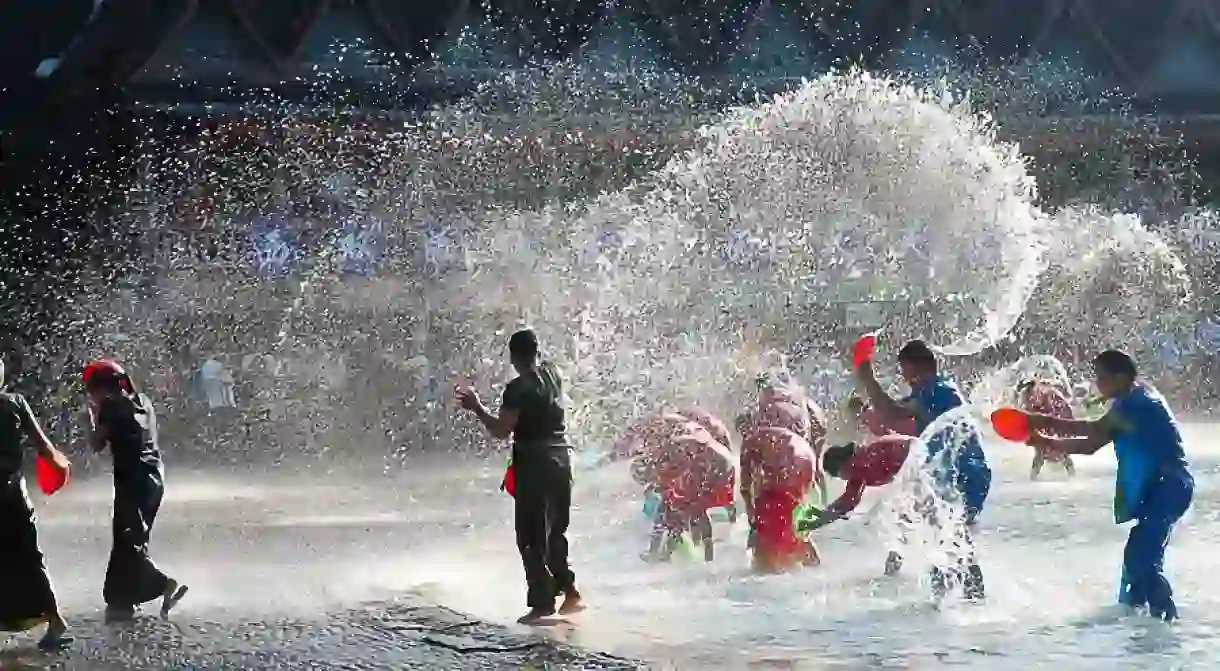The Water Splashing Festival You Didn’t Know Existed in Xishuangbanna, China

Deep in south Yunnan province, on the borders of Burma, Laos, and Vietnam, live the Dai people. The Dai are an ethnic group closely related to the neighbors, the Thai, with whom they share a number of cultural and religious traditions, including the famous Water Splashing festival. This festival is one of the most wild and crazy celebrations in all of Yunnan province, and a unique look into the culture of the Dai.
Who are the Dai?
Once upon a time, the region of Xishuangbanna was part of a larger Dai kingdom that was completely autonomous. In the 1950s the Dai king abdicated his throne and Xishuangbanna was peacefully annexed by China. The name Xishuangbanna is itself a Dai name, a Chinese transliteration of sipsongpanna, a word that means “twelve rice growing regions,” and the Dai who inhabit this region are a part of the Tai Lue ethnic group who live not only in China but also all throughout Southeast Asia, particularly in Laos, Thailand, Burma and Vietnam. They speak the Tai Lue language, which is closely related to other Thai languages such as Laotian, and of course Thai itself. In China the Tai Lue are known as the Dai, and these people have maintained a distinct cultural presence in southern Yunnan, despite the migration of many Han Chinese to the area. Dai people are fiercely proud of their heritage and Theravada Buddhism is a strong part of their cultural tradition. Many young Dai boys spend time as monks in Buddhist temples, and the temple is central to Dai life.

What is Water Splashing Festival?
Water Splashing Festival is called 泼水节 po shui jie in Chinese, and Songkran in Thai. The two festivals are related and very similar: both have their origins in Buddhist purification rituals to celebrate and welcome the coming of the new year, and they both take place in mid April, when both the Thai and the Dai celebrate their new year. Dai New Year, unlike Chinese New Year, marks the birthday of the Buddha, Siddhartha Gautama, and falls on April 13th–16th, whereas Chinese New Year takes place in late winter.

The festival is religious in origin, centering around a ritual called “bathing the Buddha,” where statues of Buddha from local temples are washed in clean water for the new year. The water used to “bathe” the Buddha would then be dumped over the heads of the celebrants in a ritual meant to bring good luck for the coming year. This is the culminating event of the festival, taking place on the third day, after two days of dragon boat races, parades, and feasting.

Water Splashing Festival today
In recent years the Water Splashing Festival has taken on a life of its own. It is a public holiday in Xishuangbanna, so students are out of school and workers get three days off to enjoy the festivities. The festival now attracts tourists from all the place who want to experience this unique bit of Dai culture. Those who choose to visit Xishuangbanna during Water Splashing Festival should be prepared to get wet! Foreign visitors in particular are often targeted by revelers who will gleefully dump buckets of water over unsuspecting heads, or soak tourists with large water guns. The free for all water fights are most vigorously embraced by the younger generation, with the older Dai people preferring the more somber temple ceremonies, dressing up in their best traditional sarongs and welcoming the new year.
Commercialization of Culture?
The popularity of Water Splashing Festival in China and Songkran in Thailand and Laos has raised some thorny questions as to the role of tourism and industry in the growing popularity of these festivals. In Thailand, where drunken revelry often accompanies the light-hearted water games, there are always increased deaths due to drunk driving during the Songkran season, with 2016 the deadliest of all . Some have voiced concerns that out of town participants Dai Water Splashing Festival are simply participating in a crass commercialization of what was once a somber and revered ritual, and that by doing so, they are cheapening and commodifying minority cultures. However, there is no doubt that at the heart of Water Splashing Festival’s popularity one truth stands out – splashing water on others and being splashed in return is – no matter young or old, Dai, Chinese, or foreign – pure unbridled fun.














